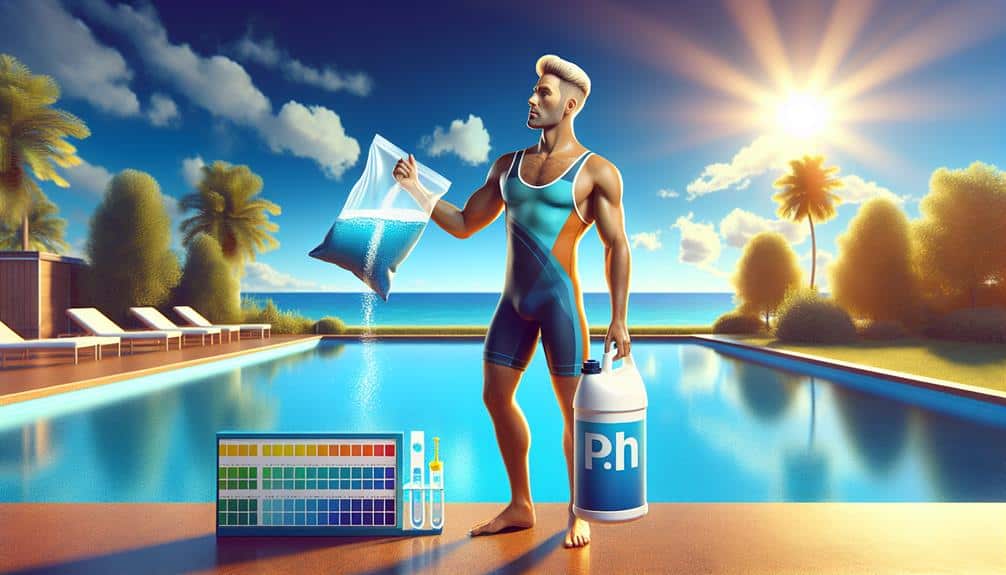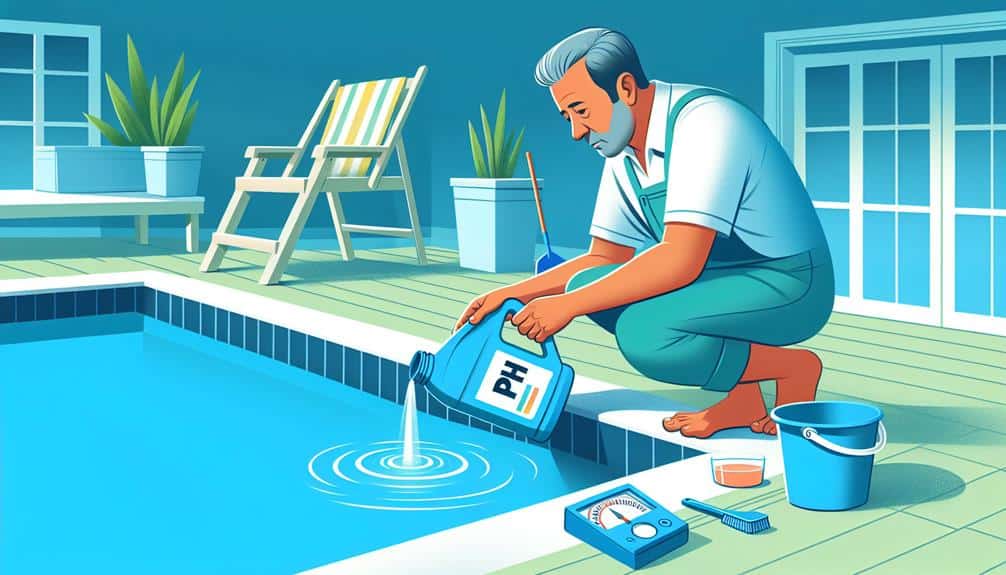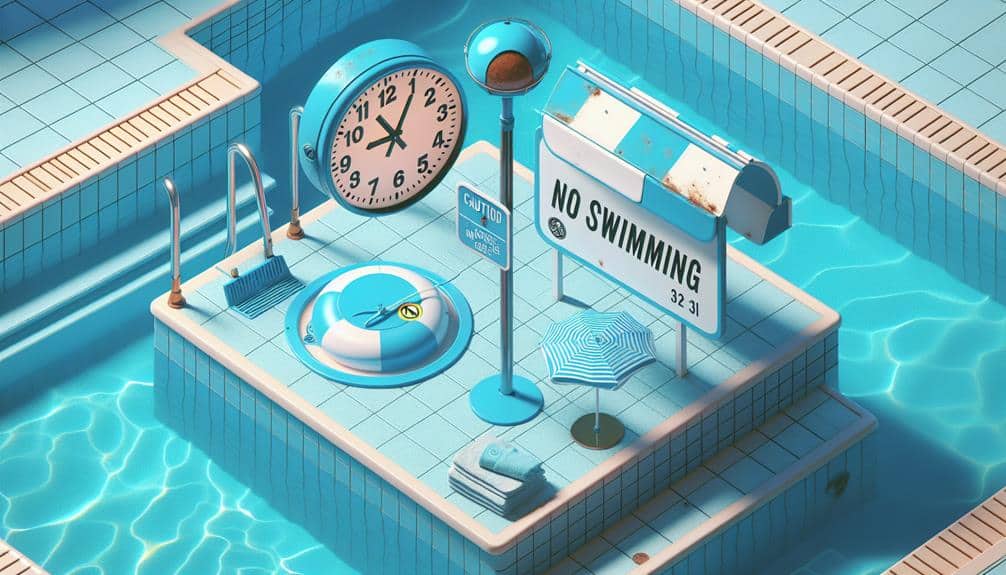If you’ve noticed that the pH in your swimming pool is a bit off, don’t fret. There are simple steps you can take to bring it back into balance. By understanding the importance of pH in pool maintenance and utilizing the right products, you can ensure a safe and enjoyable swimming experience for all. So, let’s dive into the details of how to effectively raise the pH in your pool and maintain a pristine aquatic environment.
Importance of Ph in Pool Maintenance
Maintaining the pH balance in your pool is crucial for ensuring water quality and swimmer comfort. The chemical balance of your pool water impacts its overall quality and clarity. When the pH levels are too low, the water becomes acidic, which can corrode pool equipment and irritate swimmers’ skin and eyes. On the other hand, if the pH levels are too high, the water becomes basic, leading to cloudy water and potential scaling on pool surfaces. Achieving the right pH balance is essential for proper sanitization and the effectiveness of other pool chemicals.
Water quality is directly linked to pH levels, as they affect the efficiency of chlorine in killing bacteria and algae. When the pH is within the optimal range, typically between 7.2 and 7.6, the chlorine works effectively to keep the water clean and safe for swimming. By maintaining the pH balance in your pool, you ensure that swimmers enjoy a comfortable and hygienic environment, free from waterborne illnesses and skin irritations.
Testing Ph Levels Regularly
Regularly testing the pH levels of your pool water is essential for maintaining water quality and ensuring a safe swimming environment. To accurately measure pH levels, you can use pH testing strips or a liquid test kit specifically designed for pools. These pH testing techniques are simple to use and provide quick results, allowing you to monitor the acidity or alkalinity of your pool water effectively.
Once you have tested the pH levels and identified any necessary adjustments, you can make DIY pH adjustments using common household items. For example, to raise the pH level, you can add baking soda to the water in small increments, testing the pH after each addition until you reach the desired range. On the other hand, if you need to lower the pH, you can use muriatic acid following the manufacturer’s instructions carefully to avoid overcorrection.
Using Ph Increaser Products
If you need to adjust the pH level of your swimming pool, consider using pH increaser products for a quick and effective solution. Maintaining the chemical balance in your pool is crucial for ensuring water clarity and a comfortable swimming environment. pH increaser products are specifically designed to raise the pH level of your pool water when it falls below the recommended range of 7.2 to 7.6.
To use pH increaser products, follow the instructions provided on the product packaging carefully. Typically, you’d need to add the product to the pool water while the filtration system is running to ensure proper distribution. It’s essential to wait for the recommended time before retesting the pH level to avoid overcorrection.
Aerating the Pool Water
Consider aerating your pool water periodically to help maintain optimal pH levels and water clarity. Aerating the pool water involves introducing air into the water, which can be achieved through methods like using fountains, waterfalls, or air pumps. By aerating the water, you can improve circulation, ensuring that chemicals are evenly distributed throughout the pool. This can help prevent localized buildup of substances that may affect pH levels.
Improved circulation also aids in preventing algae growth. Algae thrive in stagnant water, especially in areas with poor circulation. Aerating the pool water helps create movement, making it less hospitable for algae to develop. Algae not only cloud the water and create a greenish tint but can also affect the pH balance of the pool. By incorporating aeration into your pool maintenance routine, you can promote better water quality and reduce the chances of dealing with algae issues.
Consider adding aeration to your pool care regimen to enjoy a cleaner and more balanced swimming environment.
Seeking Professional Help
When faced with challenges beyond your expertise, consulting a pool maintenance professional can provide valuable assistance in maintaining your swimming pool. These experts are well-versed in pool chemistry and can help you navigate the complexities of pH balance to keep your pool water safe and clear. Here are some reasons why seeking professional help is crucial:
- Accurate pH Testing: Professionals have precise testing equipment to accurately measure the pH levels in your pool, ensuring the readings are reliable.
- Customized Solutions: Pool maintenance professionals can tailor solutions based on your pool’s specific needs, creating a personalized plan to address any pH imbalance effectively.
- Prevent Damage: Incorrect pH levels can damage pool equipment and surfaces. Professionals can prevent costly repairs by maintaining the right pH balance.
- Expert Advice: Pool professionals offer valuable insights and tips to help you understand the importance of pH balance and how it affects your pool’s overall health and longevity.
Frequently Asked Questions
Can I Use Household Items to Raise Ph in My Pool?
You can use household items to raise pH in your pool. A baking soda solution or citric acid can be helpful. Mix vinegar or lemon juice for a natural approach. Remember to test the water to ensure balanced pH levels.
How Often Should I Replace the Ph Testing Kit?
When it comes to maintaining your pool’s pH testing kit, remember that a stitch in time saves nine. Replace it regularly per the manufacturer’s recommendations to ensure accurate results. Store properly to maximize shelf life.
Are There Any Natural Ways to Increase Ph Levels?
To naturally increase pH levels in your pool, try DIY solutions like adding baking soda or soda ash. These natural remedies can help balance pH levels effectively. Monitor the changes with a reliable pH testing kit.
Can I Aerate the Pool Water Too Much?
You can aerate pool water too much, causing pH imbalance. Excessive aeration may lead to pH levels rising too high. Monitor aeration levels to maintain proper balance and avoid potential issues with the pool’s water chemistry.
What Qualifications Should I Look for in a Professional Pool Maintenance Service?
When choosing a pool maintenance service, look for technician qualifications like experience and training. Service certifications from organizations like the National Swimming Pool Foundation ensure quality. These factors guarantee reliable and knowledgeable professionals for your pool care needs.
Conclusion
Now you understand the importance of maintaining the pH levels in your swimming pool for a safe and enjoyable swim. By regularly testing and adjusting the pH levels, using pH increaser products, and aerating the water, you can ensure a balanced pool environment.
Remember, keeping your pool’s pH in check is crucial for optimal chlorine efficiency and swimmer comfort.
For professional pool service in San Diego, contact us to keep your pool in perfect condition. Dive in and enjoy a sparkling, well-maintained pool!

As the premier provider of pool services in San Diego, CA, our team at Pool Service San Diego specializes in maintenance, repair, and installation. With years of expertise, we’re dedicated to delivering exceptional care and sustainable solutions for your pool’s beauty and health.



